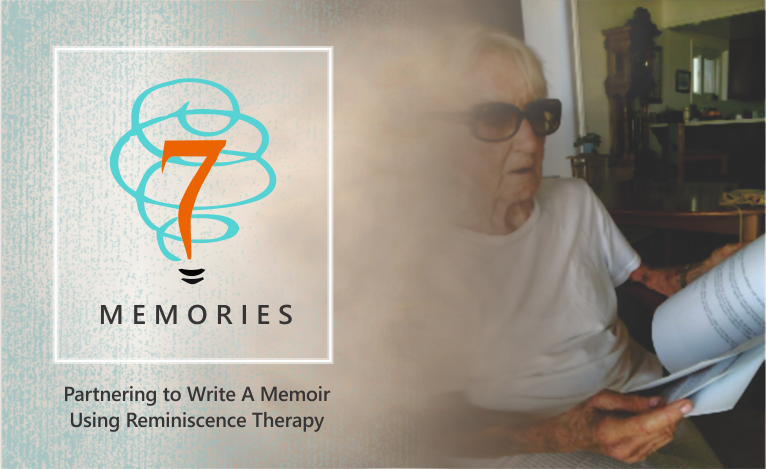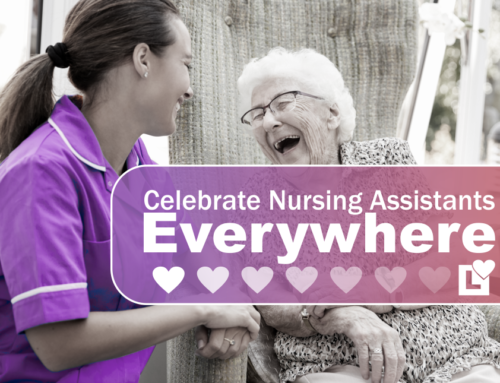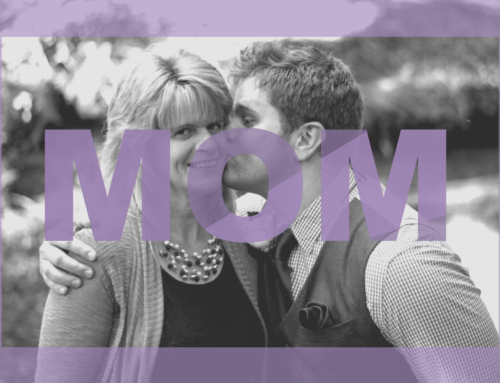“Memoir Partnering brings me back to the world. It’s fun to talk about my life and realize the blessings I have.”
These are the words of 97-year-old BJ, who reminisced about her photos and her life and now enjoys the resulting memoir. Her memoir was written using 7 Memories: Partnering to Write a Memoir, that puts Reminiscence Therapy in the hands of family, friends, and volunteers who want to capture memories of those whose recall is fading.
Reminiscence Therapy
Reminiscence Therapy is the use of life histories to improve psychological well-being, as defined by the American Psychological Association. The original idea is credited to Erik Erikson who included it as part of his eight stages of psycho-social development from birth to death. In late adulthood, the last stage, he posited that it becomes important for us to look back on our lives with satisfaction before we die. In 1963, Dr. Robert Butler formalized the idea and coined the term “Reminiscence Therapy.”
Since the 1960s, numerous studies with older adults, show that Reminiscence Therapy improves cognitive function, quality of life, and emotional well-being. It provides older adults with a sense of overall life satisfaction and coping skills, and may also help to ameliorate the symptoms of depression and dementia.
Rather than approach reminiscence as therapy, 7Memories.com approaches it as intentional storytelling from one person to another, resulting in a written memoir. 7 Memories: Partnering to Write a Memoir offers the Memoir Partner (MP) a specific method for using photos and memorabilia to evoke memories in the older person, termed the Extraordinary Person (EP). When the EP recalls the life-shaping challenges s/he has overcome, self-esteem, coping skills, memory, and mental agility improve. The EP reflects on life and how s/he wants to be remembered—and leaves a message. The memoir is information passed from one generation to another—and a physical manifestation of a life that will not be forgotten.
While the Memoir Partnering Method is not intended as therapy, depending on the EP, it can include the three types of Reminiscence Therapy: informative, evaluative, and obsessive (feeling guilty). For example, BJ enjoys retelling of stories from her past, and informing others about cultures and mores long gone in society. She recalls living on a farm with no water or electricity and attending a one-room schoolhouse. And she can relate her favorite childhood recipe from memory. While she has suffered significant losses, she tells of overcoming adversities and now counts her blessings. In evaluating the past, she’s proud of her family and her service in the Marines and seems to have no regrets. Yet as positive as BJ is, there are times when she feels depressed about the physical decline due to aging, especially short term memory, hearing, and sight. At those times, she picks up her memoir and reads sections, especially the letters written to her by friends and family. She knows she is loved and remembered.
In another example reflecting obsessive reminiscence, a daughter recounted a humorous incident about her deceased mom who had lived in a nursing home. In relating the story, the daughter moved from the “stubborn” mom to the “determined” mom and could look back with humor. The mom had hoped to live to 100 so she could have her name in the paper, but passed away at 93 years of age. The daughter fulfilled that wish and gained a sense of peace with her death by having her mom’s photo and story posted in a blog on social media.
The purpose of 7 Memories: Partnering to Write a Memoir, is to provide a complete guide—how to use Reminiscence Therapy to turn memories into memoirs. It provides everything the MP needs to start and finish the memoir—from the introduction, reflective listening, templates, and memory prompts to optional “homework” for EPs who can work independently after each session to reinforce memories. Based on personal photos and memorabilia, it can include all sensory modalities, visual, auditory, gustatory/olfactory, and tactile. The method can be adapted to specific individual skill levels and used in small groups.
The use of photos and memorabilia is key in evoking memories, even in the most reluctant and least talkative EPs. Said one MP, “Before I used this book, I couldn’t get my 91-year-old dad to talk much about himself and I didn’t have a clue as to how to engage him in a meaningful conversation about his life. When I got him focused on photos and memorabilia, it opened a new world of personal discussion. He realized the many successes he had and we laughed a lot. And he’s so proud of the memoir pages we’re creating. The Memoir Partnering Method brought us much closer together.” The close bond created is invaluable.
Even in close mother-daughter connections, deeper bonds are created. Said one MP, “This method was a gift to both of us. The questions in the guide were awesome. The prompts made a world of difference as they brought out information I hadn’t thought about. And I learned things about my mom I never knew. As my mom became more despondent and depressed, she perked up when we talked about her photos.” Note that in this case, the MP finished the beautiful memoir just a few days before her 86- year-old mother passed away. Now she and her family treasure her mother’s words as recorded in her memoir.
Behind any physical or mental decline in an older adult, is a lifetime of precious experiences. Each person is a living history book with wonderful stories to tell of a culture that is often lost to us. When we take the time to listen with interest and write their stories, we learn wonderful information about the world—and bond with them in ways we never imagined. And they benefit with improved recall and self-esteem—and a memoir ensuring they will be remembered. All of these amazing stories are lost to us and future generations, unless we take the time to encourage and help older adults reminisce and write their stories.
It’s about time. Based on Reminiscence Therapy, a memoir is a lifetime of experience and learning passed on to future generations. Otherwise, it’s a lifetime lost, like a library burning to the ground.
Author’s Note: BJ’s memoir is all the more precious …. she passed away at the age of 98.








Leave A Comment